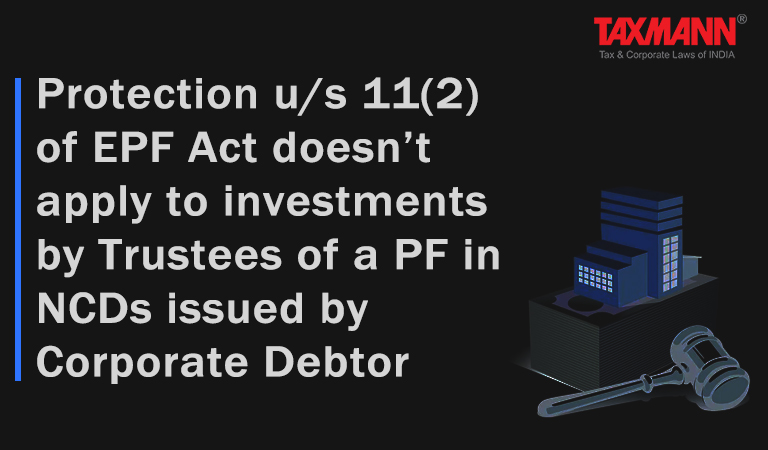Protection u/s 11(2) of EPF Act doesn’t apply to investments by Trustees of a PF in NCDs issued by Corporate Debtor
- Blog|News|Insolvency and Bankruptcy Code|
- 2 Min Read
- By Taxmann
- |
- Last Updated on 4 February, 2022

Case Details: SESA Group Employees Provident Fund v. Dewan Housing Finance Corporation Ltd. [2022] 135 taxmann.com 4 (NCL-AT)
Judiciary and Counsel Details
-
- M. Venugopal, Judicial Member
- V. P. Singh and Dr. Ashok Kumar Mishra, Technical Member
- Gopal Jain, Sr. Adv. Pallav Mongia and Ms. Tanishka Khatana, Advs. for the Appellant.
- Raunak Dhillon, Ms. Madhavi Khanna, Shubhankar Jain, Animesh Bisht, Ms. Saloni Kapadia, Ashish Bhan, Ms. Chitra Rentala, Amriddhi Shukla, Ketan Gaur, Kaustub Narendran, Ms. Lisa Mishra, Aayush Mitruka and Vishal Hablani, Advs. for the Respondent.
- M. Venugopal, Judicial Member
Facts of the Case
In the instant case, the question that arose was “whether protection/priority under section 11(2) of EPF Act would apply to investments made by Trustee of a PF in Non-Convertible debentures issued by the Corporate debtor?
NCLAT Held
The NCLAT observed that the protection under section 11(2) of EPF Act applies in the insolvency of Corporate Debtor (CD) only to amounts due by CD qua employer in respect of PF contributions w.r.t. its employees.
Section 11(2) does, not apply to investments by the Board of Trustees of a Provident Fund in Non-Convertible Debentures (NCDs) issued by the CD when there is no legal compulsion on the Trustees to invest the corpus of the Provident Fund in only NCDs and these can be invested in deposits with RBI or SBI or other Scheduled Bank as approved by Central Govt. from time to time.
Section 11 (2) of the EPF Act provides that in case of insolvency of an employer, any contributions of PF dues would be “paid in priority to all the other debts in the distribution of the property and shall be the 1st charge on the assets.
The plain reading of Section 11 (2) of the EPF act makes it clear that the applicability of the Section would arise firstly, where the entity under insolvency is the Employer. Secondly, the priority of payment is for contributions due from an employer under insolvency.
The EPF act prioritises payments where the Employer falls into insolvency. Thus, the Corporate Debtor DHFL is not the Appellants Employer, are mere investors in the DHFL.
Investments made in the Corporate Debtor are commercial decisions and transactions undertaken by the Board of Trustees of the Provident fund. Thus EPF Act is inapplicable to DHFL in the present factual metrics.
Section 17 (3) (a) of the EPF act does not make it mandatory for the Appellant to invest in the funds lying with it in the manner done by the Appellants. In the exercise of powers conferred on it by Section 5 of the EPF Act, the central government framed the Employees Provident Fund Scheme, 1952. Therefore, like any other investment making entity, the Appellant had a specific risk-taking capacity, and the appellant investment in the DHFL was a small component of its overall deposits.
Paragraph 52 of the Employees Provident Fund Scheme provides that money belonging to the fund can be deposited with the RBI or State Bank of India or in such other scheduled bank as may be approved by the central government subject to specific directions, the central government may, from time to time, give. Therefore, there was no such compulsion on the Appellant to invest its funds in the NCD’s of the DHFL.
Disclaimer: The content/information published on the website is only for general information of the user and shall not be construed as legal advice. While the Taxmann has exercised reasonable efforts to ensure the veracity of information/content published, Taxmann shall be under no liability in any manner whatsoever for incorrect information, if any.

Taxmann Publications has a dedicated in-house Research & Editorial Team. This team consists of a team of Chartered Accountants, Company Secretaries, and Lawyers. This team works under the guidance and supervision of editor-in-chief Mr Rakesh Bhargava.
The Research and Editorial Team is responsible for developing reliable and accurate content for the readers. The team follows the six-sigma approach to achieve the benchmark of zero error in its publications and research platforms. The team ensures that the following publication guidelines are thoroughly followed while developing the content:
- The statutory material is obtained only from the authorized and reliable sources
- All the latest developments in the judicial and legislative fields are covered
- Prepare the analytical write-ups on current, controversial, and important issues to help the readers to understand the concept and its implications
- Every content published by Taxmann is complete, accurate and lucid
- All evidence-based statements are supported with proper reference to Section, Circular No., Notification No. or citations
- The golden rules of grammar, style and consistency are thoroughly followed
- Font and size that’s easy to read and remain consistent across all imprint and digital publications are applied



 CA | CS | CMA
CA | CS | CMA
